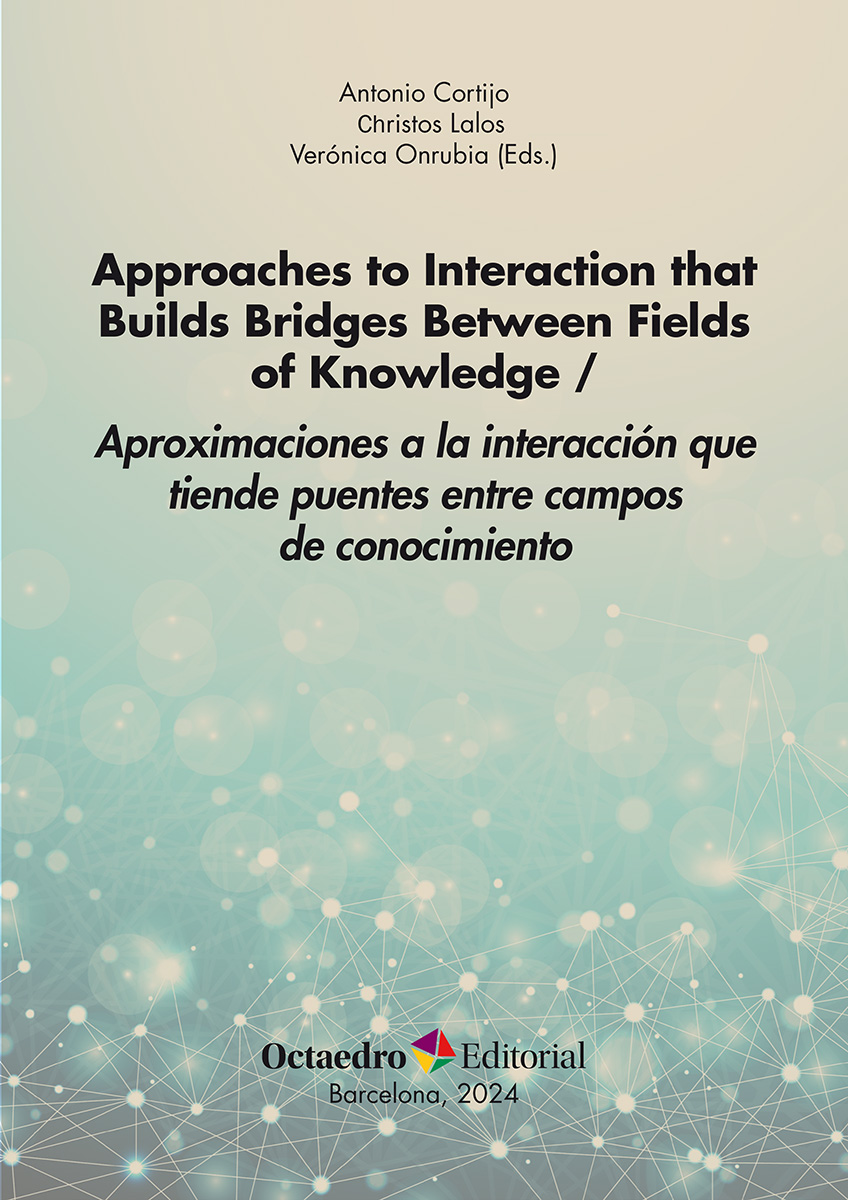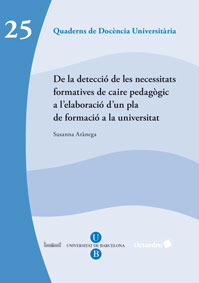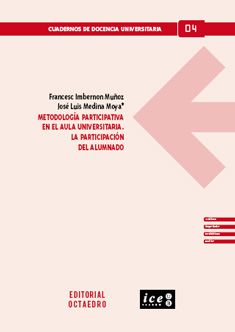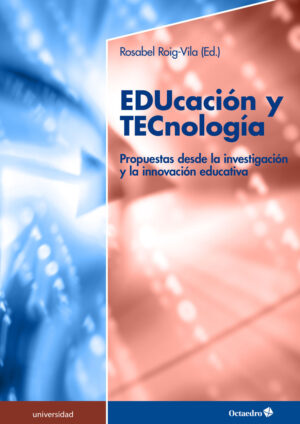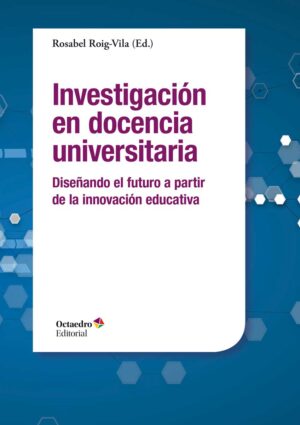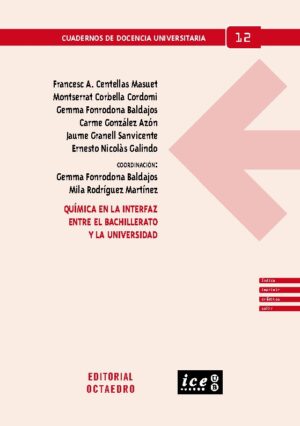FICHA TÉCNICA
PDF:
ISBN: 9788410790193
DOI: http://doi.org/10.36006/90040-1
Referencia: 90040-1
Fecha: diciembre, 2024
Tamaño: 183 (2,3 MB)
Approaches to Interaction that Builds Bridges Between Fields of Knowledge / Aproximaciones a la interacción que tiende puentes entre campos de conocimiento
Edición: Antonio Cortijo, Christos Lalos, Verónica Onrubia
OPEN ACCESS
Presentación
In an increasingly interconnected and multicultural world, interdisciplinary research aimed at innovating and implementing advancements has become a strategic tool for building bridges between cultures, breaking down communication barriers, and fostering inclusion in all spheres of society. This book is a compendium of ideas, methodologies, rigorous analyses, and research that invites educators and researchers alike to explore new perspectives and approaches in this fascinating field. It offers a roadmap through the challenges and opportunities that knowledge emerging from the interaction between disciplines and sciences can provide in a globalized world. The work is based on a fundamental premise: teaching second languages is not merely an academic task but a deeply human activity. Every interaction in the classroom, the laboratory, knowledge resource management centers, and their application in society—and ultimately, every effort to communicate an idea—is an act of connection, of constructing meaning, and of reaching out to the unknown. The authors have created a rich and diverse mosaic combining theory, practice, and innovative applications, making this book a reference for understanding the complexities of innovation and its real-life transfer in the 21st century. In summary, this book is an invitation to rethink how we teach and learn, how we manage leadership, how and what we do for more effective inclusion, and ultimately, how to improve society. Through its pages, the authors remind us that rigorous, thoughtful, and profound research—whether quantitative or qualitative—is, at its core, about building bridges between people, cultures, and ideas. With its conceptual richness and practical focus, this book will undoubtedly serve as a source of inspiration for all those committed to advancing research in Social Sciences, Humanities, and ICT in a global context. We hope its reading motivates us to continue innovating, experimenting, and, above all, teaching with passion and purpose.
En un mundo cada vez más interconectado y multicultural, resulta de todo punto estratégica la investigación interdisciplinar tendente a innovar e implementar avances como herramienta indispensable para construir puentes entre culturas, derribar barreras comunicativas y fomentar la inclusión en todas las esferas de la sociedad. Este libro es un compendio de ideas, metodologías y análisis e investigaciones rigurosas que invita tanto a docentes como a investigadores a explorar nuevas perspectivas y enfoques en este fascinante campo. Se trata de una propuesta de hoja de ruta a través de los retos y las oportunidades que el Conocimiento surgido de la interactuación entre disciplinas y ciencias puede ofrecer en un mundo globalizado. La obra parte de una premisa fundamental: la enseñanza de segundas lenguas no es solo una tarea académica, sino una actividad profundamente humana. Cada interacción en el aula, en el laboratorio, en los centros de gestión de recursos de conocimiento y de su aplicación a la sociedad, y, en definitiva, cada esfuerzo por comunicar una idea es un acto de conexión, de construir significado y de tender la mano hacia lo desconocido. Los autores han dispuesto un mosaico rico y diverso que combina teoría, práctica y aplicaciones innovadoras, haciendo posible que este libro devenga en referencia para entender las complejidades de la innovación y su transferencia a la vida real en el siglo XXI. En resumen, el presente libro es una invitación a repensar cómo enseñamos y aprendemos, como gestionamos liderazgos, cómo y qué hacemos para una inclusión más efectiva, como, en suma, mejorar la sociedad. A través de sus páginas, los autores nos recuerdan que la investigación rigurosa, serena, profunda, sea cuantitativa o se cualitativa es, en el fondo, tender puentes entre personas, culturas e ideas. Este libro, con su riqueza conceptual y su enfoque práctico, será sin duda una fuente de inspiración para todos aquellos comprometidos con la mejora de la investigación en Ciencias Sociales, Humanidades y TIC en un contexto global. Deseamos que su lectura nos motive a seguir innovando, experimentando y, sobre todo, enseñando con pasión y propósito.
Índice
Foreword / Prólogo: Claves de la interacción que tiende puentes entre campos de conocimiento
Keys to Interaction that Builds Bridges Between Fields of Knowledge (Prof. Dr. Antonio Cortijo, Dr. Cristos Lalos, Investigadora Verónica Onrubia)
1. Clarification of the Second Language Teaching with the Second Language Acquisition: Approaches and Implementations (Arsenia Anagnou)
2. Conducting a Psychometric Assessment for the Diagnosis and Evaluation of Autism Spectrum Disorder in School-Aged Children (Nikitas Dimopoulos)
3. Literature Review on Bipolar Disorder in Children and Adolescents (Nikitas Dimopoulos)
4. Use of AI in Differentiated Instruction (Lazaros Efstathiadis)
5. Electronic Health in The European Union (Kleio Marina Katogianni)
6. Teachers’ Treatments of Student Delinquency in Primary Education (Eirini Kouki)
7. The Situation of Information Systems in the Greek Public Administration (Dr. Christos Lalos)
8. The role of mentoring in shaping effective leaders in education (Freideriki Liakou)
9. Mentoring – Coaching as a form of Educational Consulting (Eleni Ioakeim)
10. Conceptual Approaches of Special Education In Greece and A Brief Reference To Reading Ability Of Deaf Students (Elli Oikonomou)
11. Changes and Expectations from the Impending Operation of Private Higher Education Institutions in Greece in Relation to Lifelong Learning for Financial Auditors (Nikos Tetradis)
12. Τhe folk tale and its theatrical adaptation into a Drama. An instructive sentence (Eleni Tsiantoula)
13. Physical Education teachers’ attitudes towards inclusion of children with disabilities in their classes: A review of Greek literature (Aimilia Vakoufari)
14. Current State Of Information Systems In Schools In Greece (Aikaterini Xenidou)
